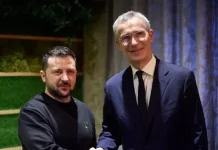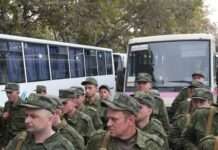A joint declaration on the nuclear disarmament treaty of the United Nations that criticized Moscow’s military takeover of the Ukrainian nuclear facility Zaporizhzhia has been vetoed by Russia.
Parts of the draft statement were opposed to by Moscow, including worries over Russia’s seizure of Europe’s largest nuclear power plant in Ukraine.
The final draft, which was more than 30 pages long, according to Igor Vishnevetsky, deputy director of the Russian Foreign Ministry’s Non-Proliferation and Arms Control Department, lacked “balance.”
“Our delegation has one key objection on some paragraphs which are blatantly political in nature,” he said, adding that Russia was not the only country to take issue with the draft text.
The Nuclear Non-Proliferation Treaty (NPT), which 191 signatories review every five years, aims to prevent the spread of nuclear weapons, promote complete disarmament and promote cooperation in the peaceful use of nuclear energy.
The nations have been gathered at the UN headquarters in New York since August 1, participating in a month of negotiations, including a final session that was postponed for several hours on Friday.
The conference’s president, Gustavo Zlauvinen of Argentina, said it was “not in a position to achieve agreement” after Russia took issue with the text.
The latest draft text had expressed “grave concern” over military activities around Ukrainian power plants, including Zaporizhzhia, as well as over Ukraine’s loss of control of such sites and the negative effect on safety.
During the conference, the signatories spoke about a number of other controversial topics, such as Iran’s nuclear program and North Korea’s nuclear tests.
The parties were likewise unable to reach an agreement on substantive matters at the previous review meeting in 2015.
Due to the COVID-19 pandemic, the review conference that was supposed to take place in 2020 was postponed.
The world was in “a nuclear danger not seen since the height of the Cold War,” UN Secretary-General Antonio Guterres said at the start of this year’s conference.
- Moscow Accuses Ukraine of ‘Chemical Terrorism’ Using Toxin
- Daughter of Putin ally killed in car bomb in Moscow
- Daughter of Putin ally was killed by Ukraine — Russia’s FSB
- Russia to add 137,000 soldiers to their armed forces
SOURCE: NEWS AGENCIES








